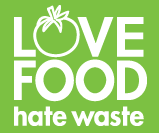
Love Food Hate Waste is a campaign, launched by the Waste & Resources Action Programme in 2007, with the aim of reducing the amount of food waste in the United Kingdom. [1] The campaign has been promoted and circulated by many green sites. [2] The campaign claims to have already helped almost two million households reduce their food waste, amounting to savings of almost £300 million and stopping 137,000 tonnes of waste going being wasted. [3] The campaign has now spread to Australia, New Zealand and Canada.